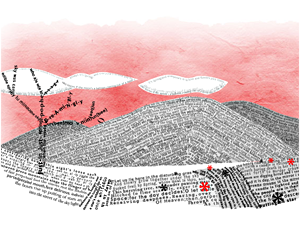Out of this weeks readings one in particular stood out to me. This reading was titled The Sweet Old Etcetera , by Allison Clifford. It was another interactive piece of electronic literature, which adopts the poetry of E.E. Cummings which features crazy visual features. Depending on how you click it will form different formations and words. At one point it looked as if I had a dying tree in a hurricane on the middle of my computer screen.
This piece reminded me of music notes because of how the words would move around and form words, phrases, or just jumbled words. The visuals on this piece were beautiful ad I felt immersed in the interactive. Also, it was apparent that Allison Clifford really had a passion for this type of poetry and went all out to create a great experience for the viewers. This passion relates to the audience and even rubs off on them to keep exploring and playing around with other pieces that are similar. I also enjoyed the way the tree branched out with all of the different lines of words. This feature made it feel as it was a real tree about to tip over.
Although I just had a minor spiel on what I enjoyed out of the piece, overall I was not a big fan of this reading. It had nothing to do with the poem itself, but the way the piece of literature worked. It grinded my gears that at the start at how smashed together the words were and most of them were difficult to see. The way how half of the words were darker or lighter than other ones depending on what you clicked irritated me. I understand the point of contrast, but this was just unnecessary. Majority of the time the words that were formed meant nothing and were just plain useless. I have no issue with going through a piece a few times to get the end or correct meaning, but this made me feel as if I was a dog running in a circle chasing my tail. This piece seemed to have an identity crisis as if the author was not sure if it wanted to be a video game, wannabe music selection, or a piece of electronic literature. What was with the bouncing asterisk marks? I am not sure if my computer was acting up, but when I clicked on them nothing happened. I just assumed this was the ending. If this is true, then the piece would benefit from actually properly stating the poem is over. I do not understand why the most of the supposed parenthesis marks were there they provided nothing to the interactive. End Rant!

No comments:
Post a Comment